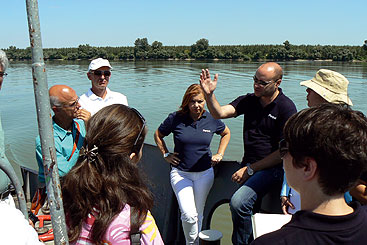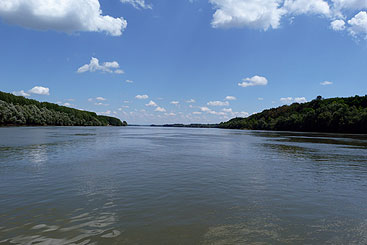Planning together is better – inside a stakeholder forum in Belgrade
Successful implementation of water
management strategies requires
close cooperation between experts
and organisations involved or interested
in river basin management
planning – in short among all stakeholders.


The third meeting of the stakeholder forum, held on the Plovput vessel Istrajni I travelling from Beska to Belgrade, gave forum members a better understanding of perspectives from navigation, environmental protection, industry and archaeology.
Water is everybody‘s issue. Government agencies are not alone in protecting shared water resources; they need to cooperate with actors from different sectors. An open, accountable process through which individuals and groups can exchange views and influence decision-making promotes sustainable decisions by providing participants with the information they need in a meaningful way.
A project in Serbia by the Directorate for Inland Waterways Plovput demonstrates that a strategic approach and careful planning are necessary for successful public participation.
An example from Serbia. The Directorate for Inland Waterways, together with the Ministry of Transport, is the beneficiary of the project ‘Preparation of Documentation for River Training and Dredging Works on Critical Sectors of the Danube River in Serbia’. The documentation is being prepared in line with Serbian legislation, as well as relevant EU and international legislation framework. This project, fully funded by the EU, began in 2011 and will be finalised in 2013.
The basic approach within the project is to establish conditions which would ensure minimum navigable depth and width of the fairway of the Danube River during the low water periods, while respecting environmental interests. The adopted guidelines for the development of the documentation within this project include: preserving connectivity conditions of the water bodies, preferable application of detached structures, preserving sediment equilibrium and ensuring mitigation measures.
Bringing stakeholders together. Integrated inland waterway management is oriented towards harmonising the interests of various stakeholders, and respecting national and international legal frameworks, including, among others, the Joint Statement on Guiding Principles on Inland Navigation and Environmental Protection in the Danube River Basin.
The Stakeholders’ Forum of the project was established in line with the long-term orientation of the Directorate for Inland Waterways Plovput towards application of the modern concept of inland waterways management, as well as with identified good practice in implementation of similar projects on the Danube River.
The kick-off meeting of the Stakeholders’ Forum was held on 26 June 2012 in Belgrade. The basic principles of the forum included: voluntary membership that was free of charge, mutual acknowledgment of and respect for the various standpoints of the forum members and transparency of the work. Those basic principles are part of the general rules on organisation and work of the forum, agreed upon by the forum, members at the second meeting of the forum, which was held on 17 July 2012 in Belgrade.

The project in Serbia aims to establish the minimum navigable depth and width of the Danube River during the low water periods, while preserving sediment equilibrium and connectivity conditions of the water bodies.
Finding solutions together. The Stakeholders’ Forum is a multidisciplinary body in which different interests are represented: navigation, environmental and nature protection, industry and archaeology. The advisory group was made up of the ICPDR, the Institute for Nature Protection of Vojvodina, WWF, the Ship Masters’ Association of Serbia, the Serbian Chamber of Commerce, the National Alliance for Local Economic Development, Aqua et Archaeologia, the Centre for Ecology and Sustainable Development, and Local Agenda 21 for Kostolac.
A number of observers (all of which are welcome) have taken part at forum meetings, including the Delegation of the European Union to the Republic of Serbia, relevant Serbian ministries and other governmental institutions interested in the project, international river commissions, waterway administrations from other Danube countries, as well as NGOs which are not members of the forum.
Ensuring transparency and equal treatment. Considering the wider importance of the work being done, all forum documents are prepared and distributed in both Serbian and English. Likewise, all documents from forum meetings are available to the general public at Plovput’s web-site (www.plovput.gov.rs), ensuring direct insight for all stakeholders of the project and guaranteeing the transparency of the planning process.
A representative of Plovput is the forum chairperson, and makes sure that all forum members have equal treatment. The chairperson is also the link between the forum members and consultants (Witteveen Bos, Danish Hydraulic Institute and Energoprojekt), making sure that information is properly exchanged between forum members and consultants. Forum members have the right to raise questions as well as to make recommendations for further investigations or a more detailed analysis regarding different options for critical sectors.
Reaching goals. The third meeting of the forum took place on the Plovput vessel Istrajni I, travelling from Beska to Belgrade. This site visit was organised by Plovput at the request of forum members to get a better understanding of the current conditions on two critical sectors which are of interest for the project.
At the fourth meeting of the forum held on 14 September 2012 in Belgrade, the first big milestone of the forum was reached by a common agreement on preferred options for six critical sectors on the Danube River in Serbia, which are to be further investigated in the next phase of the project.
Plovput thanks all the forum members and observers for their active roles and contribution in the planning phase of the project. Acknowledging and understanding different interests of different stakeholders is of a crucial importance for implementation of such a complex multidisciplinary project. With everyone’s input, reaching a common understanding is possible.
For more information, please visit:
www.plovput.gov.rs/forum-zainteresovanih-strana.






